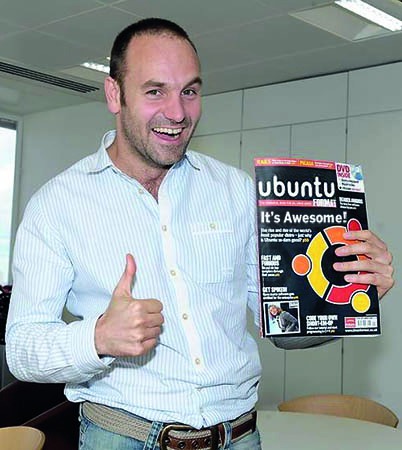11.11.13
Posted in GNU/Linux, Google, Servers at 9:17 am by Dr. Roy Schestowitz

Summary: Many GNU/Linux job openings are coming to Finland after Microsoft pretty much killed Nokia
System administration is a massively-expanding area of employment for GNU/Linux professionals. My wife and I partly work in this area and Linux Journal has just dedicated a whole issue to it [1]. Powerful systems can be built using relatively basic UNIX/Linux skills [2]. Google, noticing that a lot of huge talent left Nokia after Microsoft entryism, sets up datacentres there [3-5]. Finland, the home country of Linux, has suffered more than enough from Microsoft. It’s time for it to get its revenge by liaising with Microsoft’s worst corporate nightmare, Google.
Google is known for its high wages and I should know about it because Google approached me regarding employment thrice in the past. Google competes with malicious companies like Amazon which pay Microsoft for GNU/Linux (patents). They have some powerful features [6], but we still urge people to boycott Amazon for a lot of reasons. Amazon is still quite Microsoft-centric and it shouldn’t be shocking because Microsoft is a next-door neighbout and many ‘former’ Microsoft managers are now managers at Amazon. As part of my job I work with Amazon every now and then and Rackspace is far better in every way (for so-called ‘cloud’ hosting). Unlike Google, Rackspace is actually doing something about software patents. As for Google, there are many issues with it; it’s hard to recommend it and the next post will say more. █
Related/contextual items from the news:
-
-
-
-
-
-
Permalink
 Send this to a friend
Send this to a friend
Posted in GNU/Linux at 7:56 am by Dr. Roy Schestowitz
Free software everywhere

Photo by Barney Livingston from Brighton, UK
Summary: Tablets and smartphones, where Linux is the standard platform, are not the only form factors where freedom-respecting software is good enough for everyone
GNU/Linux is no underdog anymore. HP currently pre-installs GNU/Linux and it does not charge “Microsoft tax” [1]. As one who uses an HP laptop to write this, the feeling of saying it is pretty good, putting aside some of the negative sides of HP (no company is perfect). Almost any bit of hardware can run GNU/Linux [2], so excuses like technical difficulties (e.g. drivers) no longer pass muster and demand from the public is definitely growing (Google and its hardware partners sell many machines with GNU/Linux pre-installed). In this age of GNU/Linux with Steam and Android with Play, even gaming is hardly a valid excuse [3] (neither for game developers nor gamers). There are plenty of decent (user-friendly) desktop front ends, and even the notorious Unity is liked by some [4]. Some would go as far as saying that “Linux [became] too easy” [5,6] for the shrinking market which is desktops [7,8]. It is safe to say “shrinking” because even Intel, the company which cashed in on desktops, is feeling the pinch [9] as hardware becomes smaller and more efficient in the ours rooms and the back rooms also [10]. Tablets and smartphones, suffice to say, are an area dominated by Linux already. That is a growth area. █
Related/contextual items from the news:
-
They do supply that other OS pre-installed but you can see the price difference between that and installing GNU/Linux.
-
Jeff Osier-Mixon is a community manager at Intel for The Yocto Project, an open source collaboration project that provides templates, tools and methods to help you create custom Linux-based systems for embedded products regardless of the hardware architecture. Basically: The Yocto Project allows development to happen without the worries of what hardware the code will run on.
-
Slightly off-topic from typical gaming related news, but I thought I would start a conversation since many devs and gamers I talk with often discuss this OS or that OS as “The Next Big Thing”™. The general consensus I get from the public is that Windows 8 got off to a rocky start given the changes they’ve made to the interface. From a gaming perspective Microsoft has only added incremental updates to DirectX 11 since the release of Windows 8.0. Microsoft today has released Windows 8.1 RTM and it comes with DX 11.2 (IMO nothing big, but some convenient updates). Despite public backlash against tiles and Windows apps, Microsoft decided to release the update via the Windows Store app (oh the irony). They also forgot to mention that you need a special update for Windows 8.0 in order to download 8.1. Not off to a good start. So I just finished the update and after waiting just a little over an whole hour for it to finish, I’m regretting it big time. My standard desktop account was replaced and I’m now logged in using my online Microsoft account. Seriously?
-
I just use the default Unity interface. It’s not perfect, but it doesn’t do anything egregiously bad like Windows does. I don’t like the launcher (I rely on Synapse instead), but I love the top bar with the unified messaging/audio/etc. The indicators on the sidebar are great, too.
-
-
It’s hard to believe, looking at the modern computing world, but there is still more to life than Windows or Unix… and today, most of the alternatives run on vanilla x86 hardware and are free.
-
Tablets and smartphones are PCs! The real problem, for some companies, is that they have been producing what Wintel wanted and not what consumers wanted, small cheap computers. Naturally, if you’re trying to sell these people big expensive computers, they won’t be buying. The market for personal computers is thriving, according Statista. Look at shipments per annum (millions):
-
-
Decision is puzzling given Intel’s potential to catch up in the tablet market
-
A new supercomputer being deployed this month in the U.S. is using solid-state drive storage as an alternative to DRAM and hard drives, which could help speed up internal data transfers.
Permalink
 Send this to a friend
Send this to a friend
Posted in GNU/Linux at 7:35 am by Dr. Roy Schestowitz
Outgrowing the need for advocacy

Photo by Hannes Grobe/AWI
Summary: The need for advocacy of the leading operating system (based on units installed or shipped) is diminishing
WAY back in the days, Penguin Pete and others like him — myself included — spent a great deal of time trying to take GNU/Linux from underdog to de facto standard. With Android and some other operating systems we are pretty much there now.
Penguin Pete, who became mostly provocative (rather than informative) and at times sought attention by insulting Edward Snowden and anyone who thought surveillance was a big deal, is now throwing in the towel [1], but in a sense this action of his might actually be confirmation of the status of GNU/Linux. It no longer needs many of us (GNU/Linux users) running around, shouting from rooftops, trying to spread it. In a sense, GNU/Linux advocacy is no longer really required. The future of FOSS is assured. It doesn’t mean that there are no dangers and even patent parasites like Microsoft.
There are other new examples which help herald the end of an era of advocacy. Jono Bacon starts/joins a new audiocast focused not only on GNU/Linux [2] (it is called Bad Voltage), Linux Format turns to mobile (where Android is), and people who spent many years writing articles about GNU/Linux in servers and desktops turn just to summaries of short bits of news [4]. The British Ubuntu audiocast has a new episode titled “Gone With The Ubuntu” [5], which probably speaks volumes. Hopefully they're right. █
Related/contextual items from the news:
-
Well, I’ve arrived at a conclusion today: Starting January 1st, 2014, penguinpetes.com will no longer be focused on Linux, Free & Open Source Software, or even technology in particular. Before you all cry “sell-out!” or just cry in general, there’s three very level-headed arguments in support of this…
-
-
-
-
Permalink
 Send this to a friend
Send this to a friend
Posted in GNU/Linux, Ubuntu at 7:15 am by Dr. Roy Schestowitz

Photo by Andre urbano
Summary: Mark Shuttleworth apologises for some recent controversial behaviour of the company he founded to make “Linux for human beings”
THE STORY at hand seems like a familiar one. It is one of those cases where by “mistake” one means “we got caught, so it’s a mistake.” Canonical already went after derivatives of Ubuntu, such as “Satanic Edition” (to name just one example where later on Jono Bacon and other community figures tried to quell and put out the fire). Trademark bullying from Canonical is not something new and the company is repeating old mistakes, so these are probably not mistakes.
Mark Shuttleworth posted this long response (“Comments are closed,” but some comments can be read via “Shuttleworth: Mistakes made and addressed” at LWN). It’s a bit of hogwash, but some people still appreciate this and consider it to be a sufficient apology. This apology does not please everyone, but we should give this man the benefit of the doubt. Maybe the decision to go after FixUbuntu was not his at all. “In an encouraging and refreshing move,” wrote Muktware, “Mark Shuttleworth, the founder of Ubuntu and Canonical has apologized for calling Mir opponents the “open source tea party” [...] He also apologized for the take down notice that was sent to EFF staffer Micah F Lee over fixubuntu website.”
To quote Shuttleworth himself: “Last week, someone at Canonical made a mistake in sending the wrong response to a trademark issue out of the range of responses we usually take. That has been addressed, and steps are being taken to reduce the likelihood of a future repeat.”
Muktware correctly points out that this created a controversy, but the author goes further by comparing Canonical to Apple. The author says: “That unprecedented move from Canonical (to sen[d] take down notice) had put Canonical in the league of Apple.
“All leading news sites criticized Canonical for this move and it turned out to be the worst PR disaster for Canonical.”
Nothing actually gets done about the original mistake, which makes Ubuntu some kind of informant to the CIA/NSA (through Amazon) regarding local user searches — a malicious behaviour that Windows has been ‘renowned’ for since about a decade ago (Microsoft is an exceptionally strong NSA ally, whereas Amazon is better known for its new CIA ties as official dossiers host/architect).
Bradley Kuhn (formerly FSF and SFLC) took note of Canonical’s behaviour, having done so before when it comes to copyrights. He also wrote about trademarks in other contexts. Kuhn said: “I was disturbed to read that Canonical, Ltd.’s trademark aggression, which I’ve been vaguely aware of for some time, has reached a new height. And, I say this as someone who regularly encourages Free Software projects to register trademarks, and to occasionally do trademark enforcement and also to actively avoid project policies that might lead to naked licensing. Names matter, and Free Software projects should strive to strike a careful balance between assuring that names mean what they are supposed to mean, and also encourage software sharing and modification at the same time.
“However, Canonical, Ltd.’s behavior shows what happens when lawyers and corporate marketing run amok and fail to strike that necessary balance. Specifically, Canonical, Ltd. sent a standard cease and desist (C&D) letter to Micah F. Lee, for running fixubuntu.com, a site that clearly to any casual reader is not affiliated with Canonical, Ltd. or its Ubuntu® project. In fact, the site is specifically telling you how to undo some anti-privacy stuff that Canonical, Ltd. puts into its Ubuntu, so there is no trademark-governed threat to its Ubuntu branding. Lee fortunately got legal assistance from the EFF, who wrote a letter explaining why Canonical, Ltd. was completely wrong.”
This trademarks issue/dispute which we previously covered (as did others, including some pretty major news sites [1, 2]) is not going away any time soon. Canonical is doing what’s known as “damage control” right now. As Wired put it, even Ubuntu boosters shy away: “The editor of the Ubuntu news site, OMG! Ubuntu!, says that Canonical’s email to Fixubuntu.com “does make for uncomfortable reading,” but Joey-Elijah Sneddon believes that the company is trying to preserve its trademark rights, not silence critics. Although OMG! Ubuntu has been critical of the privacy issues, Canonical hasn’t sent him a nastygram. Were “Canonical really out to suppress criticism, they’d have given me a bit of a prod before now,” he said in an email interview.”
The comments on this article — like many articles of this kind — have been rather hard-hitting too. To quote just the top 2 (not to quote selectively): “Canonical has become a total joke. What started out as a great effort, has degenerated to a disgrace for the whole Linux community.” Another person says: “Canonical and Ubuntu have jumped the shark.”
Ubuntu is a project that I install a lot for clients, even on the servers (not my choice), so I sure hope that Canonical will get its act together and make it comfortable — ethically — to do this. KDE developers, who have just reached some new milestones [1,2], feel similarly. Upsetting KDE developers [3,4,5] is not a smart thing to do, especially by comparing them to far right-wing politics. Based on a link that Will Hill shared with us (development portal), even Debian developers are growing increasingly impatient with Canonical/Ubuntu.
Muktware, a longtime Ubuntu booster (until Canonical called it a “troll” for not towing the party line 100% of the time), said:
Canonical has sent Micah. F.Lee, a staff technologist at EFF, a take-down notice for a website he started to educate people about fixing the privacy invasive feature Canonical has built in Ubuntu.
Lee started a website called fixubuntu.com, which he describes as “a place to quickly and easily learn how to disable the privacy-invasive features that are enabled by default in Ubuntu.”
He received an email from Canonical which asked him to practically shutdown the site as it uses the name Ubuntu in the domain and also showcases Ubuntu logo.
People who accuse Canonical critics of being “divisive” should take a deep look at Canonical itself. Calling people “trolls” or “Tea Party” for simply not agreeing is not just divisive; it is offensive.
Canonical could save itself a lot of trouble by just listening to many users who are upset about the privacy violations of trust, which are probably not worth the money Canonical gets from Amazon (its partners in other areas too). Why this insistence despite the backlash? Is Canonical telling the full story? We don’t know the terms of the deal/s between those two companies and we know that the CIA funds US companies to help spy on customers (based on a new report from the New York Times). The behaviour of the search bar has been controversial and widely vilified well before the EFF spoke out about it (the FSF weighed in much later, and only after I had spoken to Stallman about the subject). The solution is simple and the mistake is well known; the big mistake is not trademark bullying, it is privacy violation. It is worth focusing on the real mistakes. They are technical — not just ethical — mistakes. █
Related/contextual items from the news:
-
-
-
The conflict that has been brewing between the KDE developers and Canonical has finally exploded in a flurry of statements which show just how many problems the Mir display server has caused.
-
One of the most important KDE developers, Martin Gräßlin, has written a message to the Ubuntu developers, saying goodbye.
-
Following Mark Shuttleworth’s critical comments about those opposed to Mir and his statements being challenged, multiple KDE developers in particular have been expressing their outrage.
Aaron Seigo was the KDE developer to challenge Mark Shuttleworth to a public debate over his colorful comments regarding those opposed to Canonical’s Mir Display Server for Ubuntu. Two weeks have passed since suggesting this public debate and there’s still been no public response by Mark Shuttleworth, though Jono Bacon and others have commented on the matter.
Permalink
 Send this to a friend
Send this to a friend
Posted in GNU/Linux, Kernel at 6:42 am by Dr. Roy Schestowitz
Linux is inevitably getting more political

Summary: Linux — like GNU — has its liberal licence used as a selling point, especially in this age of “Peak Surveillance”
Mark Hinkle, who used to be a vocal proponent of GNU/Linux several years ago (he had published plenty of articles), spoke at LinuxCon and CloudOpen Europe [1], stressing that Linux is not just a piece of software to many of us. It is a game changer, not just to those who use if for technical advantages (e.g. the US Navy [2]) but also to those who rely on it for security and defence from intrusions, which are inherent in software you can neither modify nor review. One of the senior writers over at Linux Journal has an excellent article which points out how it relates to surveillance [3] and another new article [4] explains how code freedom (as in Free software) facilitates an escape from NSA snooping. In years to come we are likely to see privacy arguments increasingly being used to promote GNU/Linux, especially in nations which have many reasons to distrust or even fear the NSA. █
Related/contextual items from the news:
-
Collaboration can change the world and Linux and open source developers must use what they’ve learned to lead the way. This was the message delivered by Mark Hinkle, director of open source solutions at Citrix, in his inspirational keynote at LinuxCon and CloudOpen Europe in Edinburgh this morning.
-
The US Navy has a reputation for being much like its main form of transportation — a big ship that’s slow to change course. After decades of relying on large-scale warships like the aircraft carrier, the Navy has been working toward a smaller, more flexible fighting force. With the impending launch of the USS Zumwalt, the Navy will be moving well into a high-tech, Linux-powered future.
-
Linus was asked if the US government ever wanted a backdoor added to Linux. He nodded “yes” while saying “no”.
-
Foreign nations have been left reeling by news that the NSA has been happily monitoring the private communications of at least 35 world leaders, on top of its all-encompassing PRISM program that was leaked earlier this year. Ed Snowden’s leaks paint a miserable picture of the dystopian position we’re in now, with the US government doing whatever it takes to dismantle our freedom and privacy online.
Permalink
 Send this to a friend
Send this to a friend
Posted in GNU/Linux, Microsoft, Windows at 6:16 am by Dr. Roy Schestowitz

Summary: Why the imminent end of Windows XP is likely to lead to a lot of GNU/Linux adoptions, especially where it’s required by state law or other rules/regulations
A writer at CNET, which is part of CBS, recently started an Internet-wide discussion when he wrote about “[h]ow to decide if Linux is right for you” [1]. This discussion reached as far as its competitor, IDG, where a distro reviewer and relatively new pundit addressed the subject, rephrasing it as a question [2]. Security experts in Holland are certain that GNU/Linux is suitable and worth considering for replacing Windows XP [3,4], which reaches its End of Life (EOL) in a matter of months. Evidence suggests, based on this new article [5] from ZDNet (also part of CBS), that old computers with Windows XP can be refurbished “on a budget” with fairly full-featured distributions like openSuSE and Fedora 19. Interesting times are ahead because as a matter of compliance with the law (for governments) or guidelines (in businesses) many people will soon have to throw away their computers (incapable of running Vista and successors) or simply upgrade to a modern distribution of GNU/Linux. Microsoft extended the life of Windows XP many times (for long periods of time) because it knows this. It also lowered (significantly) the cost of Windows XP when it needed to dump it onto the market to push back GNU/Linux, especially in sub-notebooks (better known as netbooks). █
Related/contextual items from the news:
-
This open-source operating system offers a Windows-like experience without all the hassles. Plus, it’s free. Should it be your next OS?
-
Many folks using other operating systems sometimes wonder if Linux is right for them.
-
I wish my government pointed the way. I would suggest they recommend Debian GNU/Linux. I find it more reliable than Ubuntu GNU/Linux and less expensive than Red Hat GNU/Linux.
-
The Dutch government’s cyber security centre says that Linux is suitable for business users, as well as for personal use. It points to the Ubuntu or Red Hat open source distributions as a viable alternative for those that are currently using a decade-old proprietary operating system.
-
Buying refurbished systems can save a lot of money and produce impressive results: here’s what I found when testing out openSuSE and Fedora 19 on a a refurbished Lenovo.
Permalink
 Send this to a friend
Send this to a friend
Posted in GNU/Linux, Red Hat at 5:55 am by Dr. Roy Schestowitz

Photo credit: GCJKAGC
Summary: Celebrating the 10th anniversary of the Fedora project and its 20th release as well
THE FEDORA project is one of the most innovative projects in the GNU/Linux world simply because a lot of effort and investment go into it. Red Hat pours money into Fedora in order to elevate strategic goals, e.g. [1,2], and 10 years after Fedora was officially born [3,4] we have a 20th release with new — and mostly unique — features [5]. Watch who GNOME 3.10 Test Day is tied to [6] and recall where a lot of graphics on our desktops come from [7]. Fedora is a silent giant in the GNU/Linux development world. Don’t forget Red Hat’s/Fedora’s role in KDE, GNOME, a lot of Linux (kernel) development and even Anaconda [8]. Aside from technical work there is also community work [9]. Rather than disparage distributions which only take and hardly give, let’s remember to celebrate Fedora’s often-forgotten contributions to the GNU/Linux desktop. Fedora is renowned for being relatively reluctant to put convenience above freedom (it preloads no blobs where these are easily avoidable) and it develops many Free/Open Source alternatives where there is urgent need to replace proprietary software, e.g. graphics drivers. █
Related/contextual items from the news:
-
Docker is a server application/container deployment system, which nicely sidesteps a lot of the complexity with desktop apps (not having to integrate deeply with the desktop) which makes it a lot easier to deploy. Additionally, docker is more than a deployment system, it also has some interesting ideas about how to create and distribute applications.
-
Docker (previously dotCloud) made a big splash this year when they open-sourced their software for creating “lightweight, portable, self-sufficient containers” that powers their Platform-As-A-Service offering.
-
Fedora is now 10 years old and is now one of the most beloved Linux distributions. When it was started, it was hated.
-
Fedora is one of the most respected GnuLinux distributions around. It’s been used by leading Linux developers including the father of Linux, Linus Torvalds himself.
There are so many different elements that sets Fedora apart from the rest of the GnuLinux distributions – one of the most notable features of Fedora is innovation. Fedora is a cutting edge operating system which keeps it users at the edge by offering latest packages.
Second beauty of Fedora is heavy contribution to upstream – unlike many other GnuLinux projects which make changes downstream to benefit their own users, Fedora developers prefer working upstream so that everyone benefits from their work including products like Ubuntu.
-
Fedora 20, the next version of the open source operating system sponsored by Red Hat, will bring several feature updates to the world of desktop Linux when it debuts December 17.
-
I recently announced a call to action for GNOME 3.10 Test Day for Fedora 20 on Facebook and I got a response that caused me to think about how everyone from the general public to developers submit and fix bugs for an open source project.
-
My first digital painting program was the Smurfs Paint ‘n Play for the Coleco ADAM. When we finally got a PC with a VGA card, I used Deluxe Paint II and the Disney Animation Studio painting programs. I used Photoshop and Gimp when I was in high school and was introduced to the Macromedia tools in college. My tools of choice in college were Macromedia Fireworks for almost everything, and Adobe Illustrator, Macromedia Director, and Macromedia Flash for everything else. I followed sodipodi and I switched over 100% to FLOSS tools around Inkscape 0.39.
-
As you may know, Fedora totally redid their Anaconda installer starting with Fedora 18. There are many reasons for it and I’ll not go into that here but one perception out there in Internet land is that the partitioning section of the newer Anaconda installer is a pain to use. I must admit that when I first started using it (installing Fedora 18 alpha and beta releases), I really did not like the changes. This dislike persisted for some time until I finally got used to it. Then time passed. Fedora 19 development started, ran its course, and then Fedora 19 was released. It offered some Anaconda refinements. Now Fedora 20 is approaching its beta release and there are yet more Anaconda refinements.
-
Are you or do you know of a woman who is interested in getting involved in open source and would be available for a full-time internship running from Dec 10, 2013 to March 10, 2014?
Permalink
 Send this to a friend
Send this to a friend
Posted in Red Hat at 5:31 am by Dr. Roy Schestowitz

Summary: In praise of Red Hat, whose efforts to bring GNU/Linux to government are largely successful and hence pave the way for more of the same
RED HAT recently made some headlines for its involvement in a major government effort in the US [1,2]. This symbolised an exciting breakthrough of sorts, despite the fact that Red Hat had been deeply involved in government projects for a number of years now (notably in the defence sector). Like many businesses that jump on the open ‘cloud’ (e.g. OpenStack) bandwagon [3], Red Hat is increasingly positioning itself as a ‘cloud’ leader [4], challenging the likes of Canonical [5] in this age of ‘cloud’ and OpenStack hype [6,7]. Despite or because of the growing popularity of RHEL clones (primarily CentOS [17]), Red Hat is doing well and its CEO continues to provide decent leadership [8]. Based on press releases and announcements from early October [9-13] and even a few from September [14,15], Red Hat now emphasises virtualisation and hosting (or ‘cloud’, to use marketing terms). Red Hat’s shares are expected to rise [16] and it seems safe to say that the better Red Hat does, the better off GNU/Linux as a whole will be. Unlike some other companies, Red Hat shares a lot and is hardly parasitic. █
Related/contextual items from the news:
-
Red Hat has been pegged to rescue HealthCare.gov.
-
-
-
You know Red Hat best as the leading business Linux company. You may not know that Red Hat also wants to become the top OpenStack cloud business.
-
-
Jonathan Bryce, executive director of the OpenStack Foundation, talks about where the open-source cloud is headed.
-
OpenStack, the open source cloud program, has achieved multiple milestones this week. Cisco Systems (CSCO), Canonical, Hewlett-Packard (HPQ), Red Hat (RHT), VMware (VMW), Mirantis and others have announced major moves at this week’s OpenStack Summit in Hong Kong. From cloud services providers (CSPs) to VARs, it’s time for the IT channel to take a much closer look at this technology and its business implications. Here’s why.
-
That’s according to the man himself, blogging about how finding a mentor might not be as helpful as building a team, in his case, a “Team Jim.”
-
-
-
-
-
-
-
-
A stock is considered to be oversold if the RSI reading falls below 30.
-
Permalink
 Send this to a friend
Send this to a friend

























 Content is available under CC-BY-SA
Content is available under CC-BY-SA